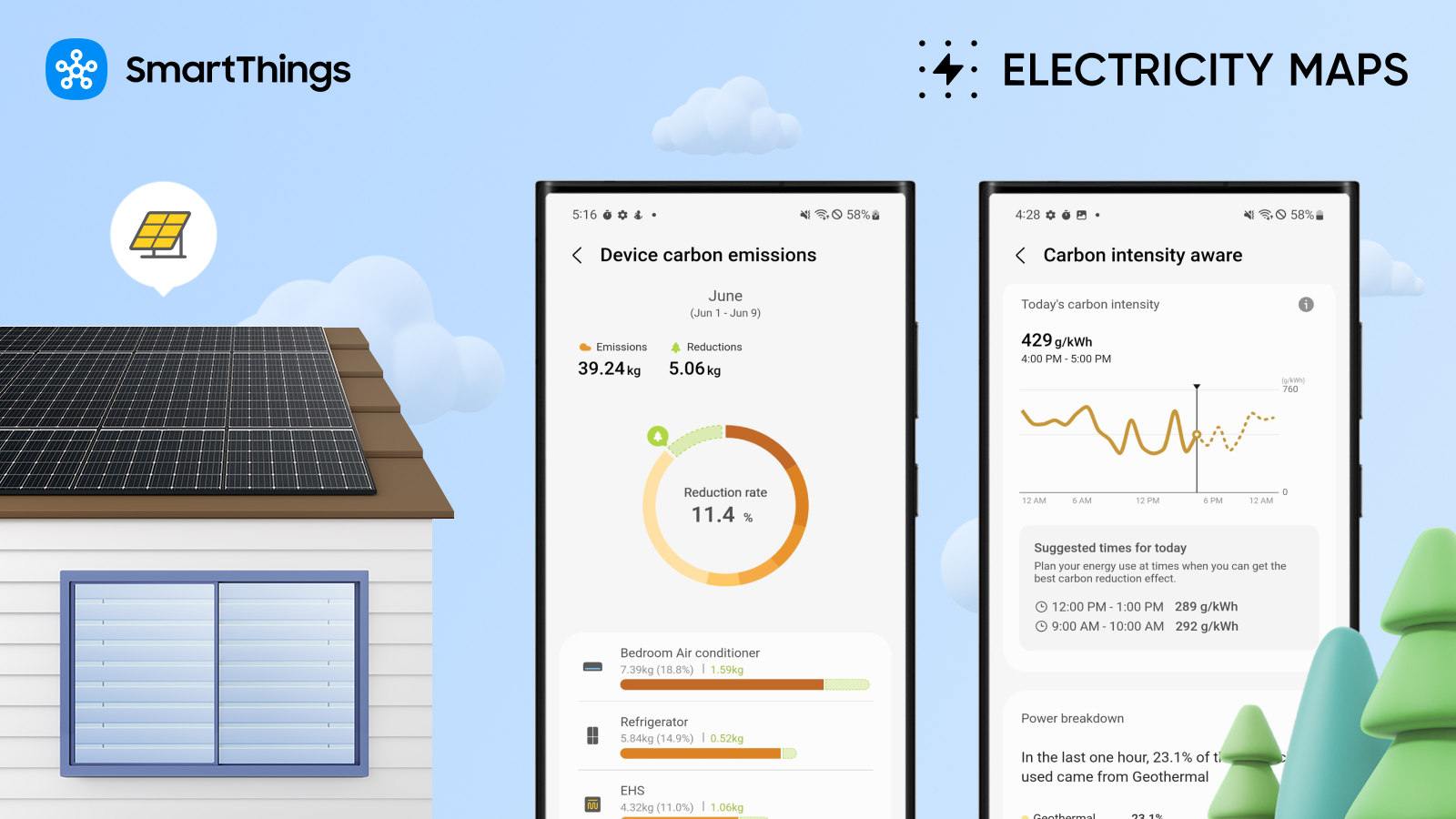Did you know that the carbon emissions from using or charging your smart home devices vary throughout the day? This means that using electricity when there is more renewable energy on your local grid — for example, on sunny days when there is a lot of solar power generated — can lower your carbon intensity and resulting emissions.
Samsung SmartThings continues its partnership with Electricity Maps, established in 2023, to provide you with even more ways to access comprehensive data within SmartThings Energy to inform your energy usage. The integration helps you be more informed about your carbon emissions and enables you to actively reduce your impact based on these fluctuations and your energy habits.
About Electricity Maps
Electricity Maps is a fast-growing Danish start-up that plays a pivotal role in the global transition to a decarbonized electricity system by organizing and mapping real-time electricity data to compute and forecast carbon intensity for over 200 zones worldwide. Their API provides individuals and businesses with more data to make more informed decisions about electricity consumption.
How it Works
Electricity Maps offers an API that enables you to access historical and forecasted data on the electricity mix and carbon intensity in a specific region through SmartThings Energy. This allows you to monitor your carbon emissions based on your home’s electricity usage. You can benefit from real-time information on your electricity usage, including details on energy sources and carbon intensity. Moreover, you can actively leverage this data to reduce your carbon footprint by utilizing features like Optimal Charging and AI Energy Mode, both available in SmartThings.
The Benefits of the Partnership
With the increase in consumers choosing more sustainable smart home purchases, SmartThings aims to offer eco-friendly solutions in the market that empower you to make more sustainable decisions and enable you to have a real impact by becoming a more informed energy consumer.
Moreover, the integration with the Electricity Maps API has expanded the capabilities of SmartThings, linking appliance energy savings data to carbon emission reduction data. This integration allowed for the launch of pivotal features within the SmartThings app, like Optimal Charging and Optimal Scheduling. The AI Energy Mode can be set to activate based on the captured carbon intensity data, focusing on reducing carbon emissions. With these intelligent features, SmartThings leads the way in providing you with the information and tools to better manage your carbon footprint.
View Your Carbon Emissions Data and Reduce Your Carbon Footprint
Electricity Maps provides global coverage, which means carbon emission insights and carbon-optimized charging and scheduling features are available to all users in the SmartThings app.
To view your carbon intensity data click here, or download the SmartThings app (if you haven’t yet)—available on iOS and Android—and navigate to SmartThings Energy.
In SmartThings, select the Life tab at the bottom of the screen to navigate to SmartThings Energy. Scroll down to the ‘Carbon emissions aware’ card, where you can access unique information on your carbon emissions. Ensure your Samsung appliances and smart devices are connected to obtain the most comprehensive data on your energy usage.
Samsung and Electricity Maps, Making a True Impact
“The carbon monitoring function using Electricity Maps is a unique solution where everyday appliance energy usage is directly linked to its carbon footprint,” said Barry Holland, Director of Product & Business Development at SmartThings. “We are excited to continue partnering with organizations focused on providing tools to inform consumers and enable them to reduce their carbon footprint.”
“Electricity Maps is proud to continue working with Samsung SmartThings, paving the way to more sustainable homes,” said Olivier Corradi, CEO and Founder of Electricity Maps. “We’re excited that our API’s carbon-intensity insights enable consumers to be more aware of their carbon emissions and to reduce their carbon footprint on a daily basis. The collective impact of millions of users optimizing their home devices will be a significant step toward decarbonizing the electricity grid.”
Related

